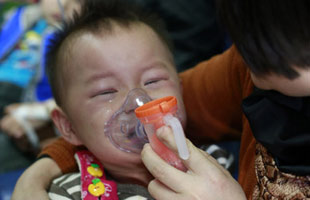Top public health experts are urging people to be vaccinated for the seasonal flu as the country is facing an epidemic more serious than last year.
Feng Zijian, deputy director of the Chinese Center for Disease Control and Prevention, said it is even tougher to contain flu viruses as people head home for this year's Spring Festival.
"Compared with previous years, the flu viruses are much more active, especially in southern China," he warned.
According to Feng, health departments have detected three major strains of the flu virus: H1, H3 and Influenza B.
In past years, usually only one strain prevailed, but this winter all three strains are active, adding difficulty to both prevention and treatment, he noted.
 |
 |
"A low vaccination rate and multiple active virus strains have led to a more serious flu control situation in China this winter," he said.
The main reason for the low vaccination rate is a general lack of awareness among the public about the dangers of the flu, as well as concerns about the safety of domestic vaccines, according to Feng.
In the US, some 27 percent of people are immunized against seasonal flu viruses. That number is 2 to 3 percent in China.
"Many simply underestimate the health hazards of seasonal flu," Feng said, urging the public to be vaccinated.
He said that an average of 142 people out of every 100,000 have been hospitalized due to seasonal flu across the country during recent flu seasons.
In Beijing, a 73-year-old man died during the ongoing flu season, according to Pang Xinghuo, who heads the CDC in the capital.
"Other underlying conditions could be worsened by a flu infection, particularly for the old and weak," she said.
The flu is at its peak in Beijing now, of all outpatient and emergency visits, 2.8 percent showed flu-like symptoms, she noted, citing results from a citywide surveillance network.
"But it's still similar to the situation last year," she noted.
She suggested that people traveling to south China or North America get a flu shot as these areas were hit even harder by the flu epidemic.
In Shanghai, Bai Jianwen, a chief physician from Shanghai East Hospital, said a large number of influenza patients have been received since early this month.
"In peak times, the medicine department can receive up to 1,200 patients each day, and among them 70 to 80 percent were influenza patients," Bai said.
Weather changes often bring on influenza, she noted.
Moreover, the smoggy weather also easily interferes with the human body's immune system, especially for those with an allergic constitution, which may increase the risk of respiratory infections, she said.
The number of influenza patients in the hospital is now decreasing to 300 to 400 each day, Bai said.
Medical worker Feng Ying from Shanghai's Zhongshan Hospital said 50 to 60 patients with fever are received in the hospital's emergency room each day, about the same as last year.
"The most efficient way to prevent the flu remains vaccination," Feng stressed.
He suggested people practice good hygiene and avoid crowded public places.
Contact the writers at [email protected] and [email protected].
